Thailand is one of the more tricky countries for travellers to handle their travel money at minimum cost. We normally tell our readers just to get money out at ATM s or cash points, but in Thailand, that costs a lot. Just withdrawing cash from an ATM in Thailand can cost you half a day’s budget, so you need a little insider information and a trick or two up your sleeve which we’re happy to share with you here.
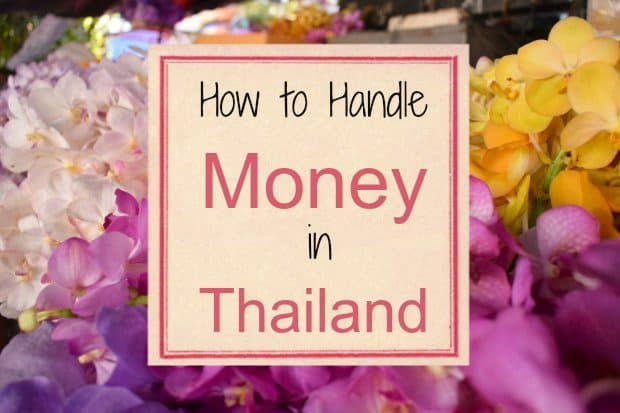
This post may contain affiliate links.
There is a way to get Thai Baht, without the fees from local Thai banks. A round-up on money in Thailand, how to take money into Thailand, and the best travel tips on travel money and exchange. See our video below, then read the tips down the page.
If you’re carrying cash or cards in Thailand, an anti-theft bag with a slash-proof body and strap, hidden pockets, plus a strong hook to attach it to furniture while seated is a very good idea. This is our favourite anti-theft large messenger travel bag to keep your money safe on your vacation or extended travels. For a smaller purse, but safer, look at this one. To keep a small amount of cash in a very secret place, consider a travel safety money belt like this, or a neck wallet for cash in Thailand.
A small travel purse, like mine below, is also very useful for carrying money in Thailand. (this is a Baggalini triple zip, see here, you can wear it cross-body or around your waist.)
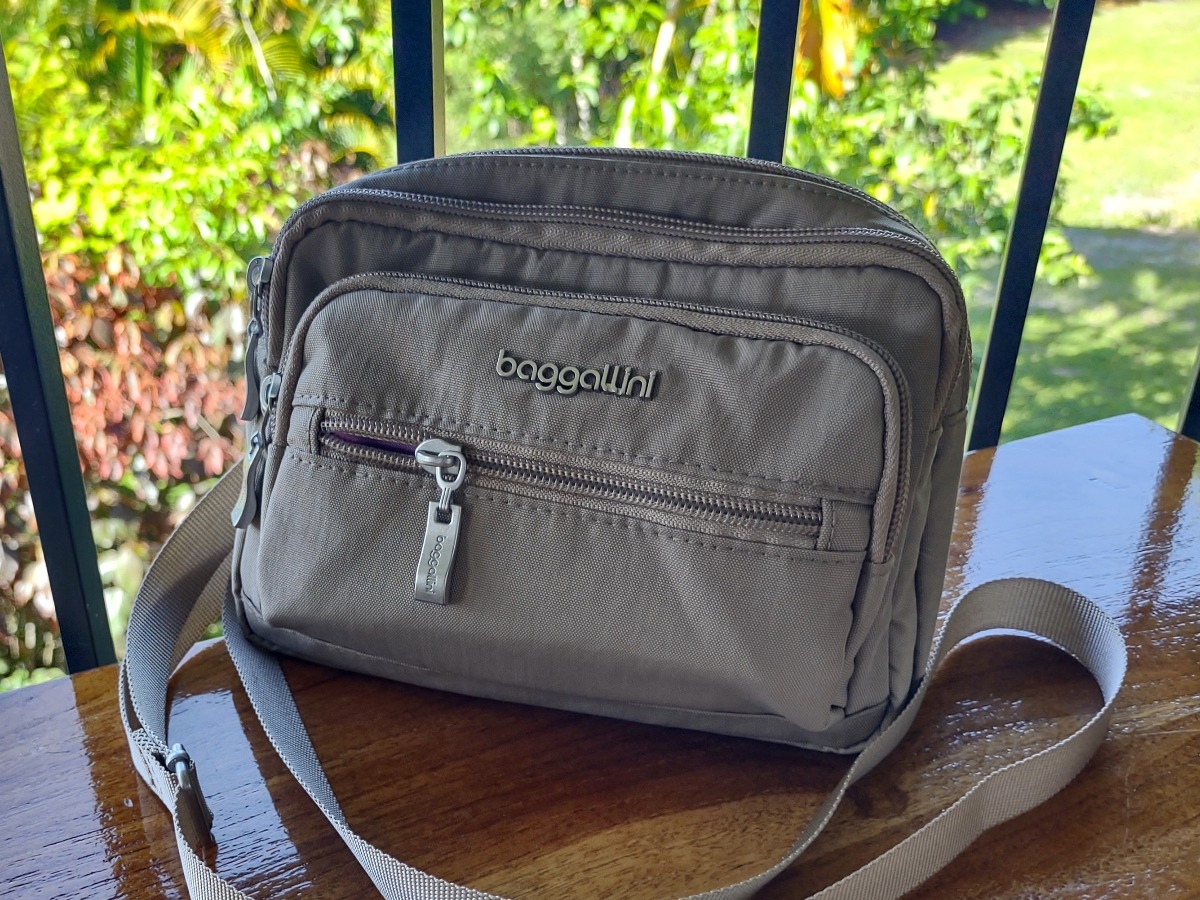
Obviously, things change, this information was correct at time of writing and you’ll need to double-check costs and fees.
The Best Way to Get Thai Baht?
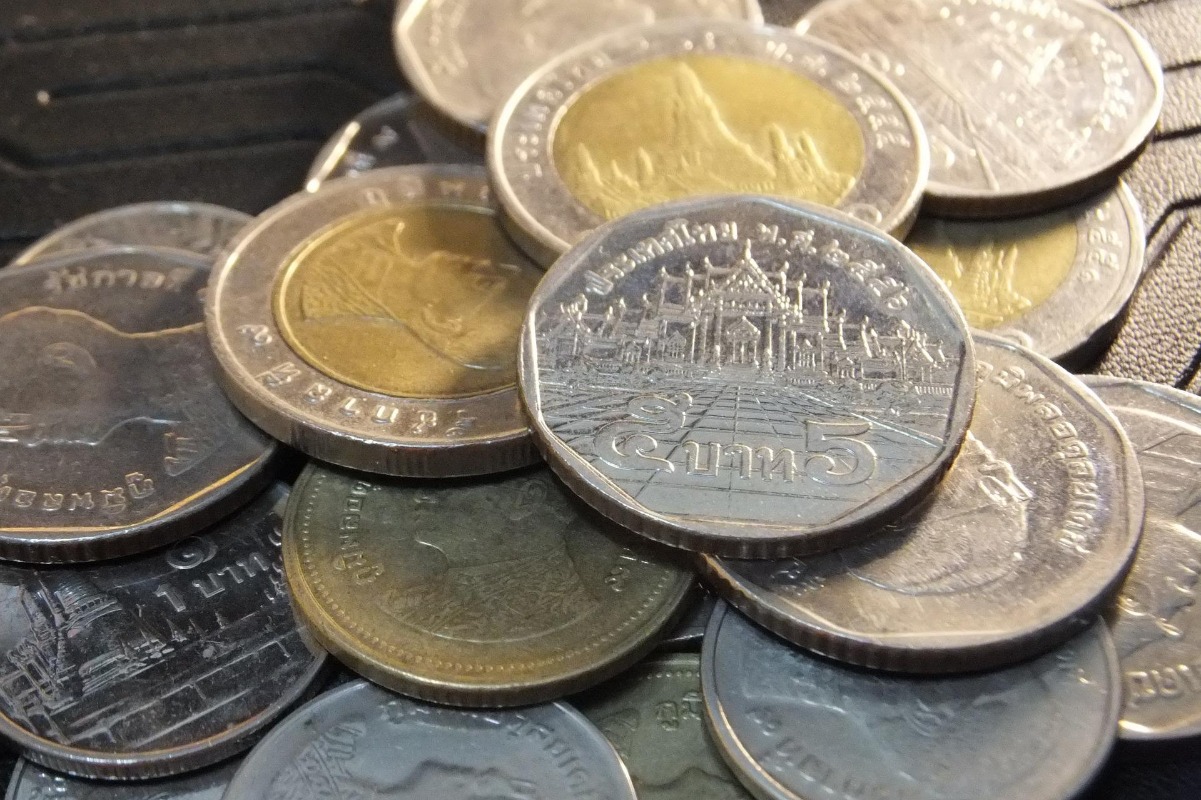
Bring some cash in your home currency with you. Changing pounds, Euros, or dollars in a currency exchange office on almost any street in Thailand gives you a better rate than most anywhere else.
Airport rates are usually lower, don’t exchange all your cash at the airport.
You will get a better exchange rate in Thailand than in your home country, almost without exception.
Travellers’ cheques do give you a better rate in Thailand than cash and they’re easy to exchange, but these days they’re rarely used.
Airport Rate in Bangkok Airport on our last visit: 41Baht : UK£
Currency Exchange Office in Bangkok, same day: 42Baht: UK£
Where to check standard currency exchange rates? Use for example, FCexchange
Fees on Cash Withdrawal at ATMs in Thailand
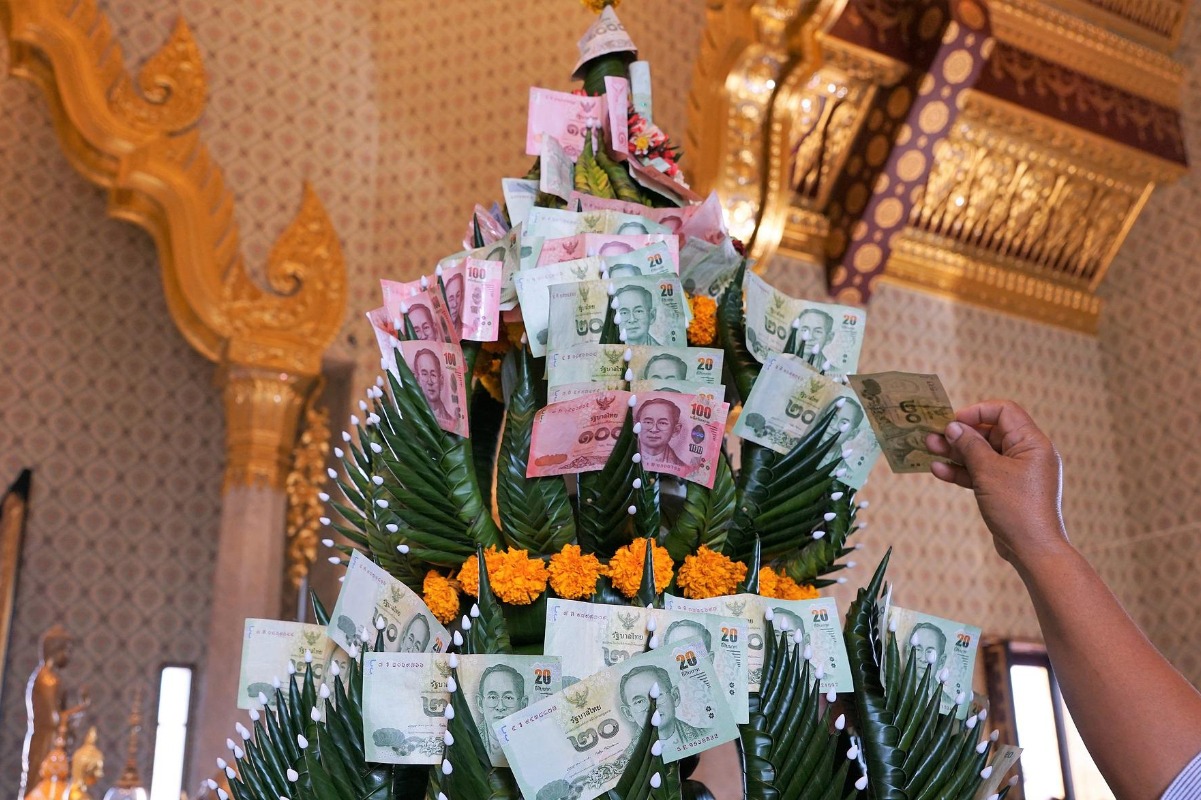
Every time you use a cashpoint (ATM) in Thailand you will be charged upwards of 200 Baht, about $7 US. Some now charge 220 Baht and of course, this may increase.
Shop around for the best ATM. Don’t stress too much, you’re unlikely to find a cheaper one because, of course, they all increase their fees in unison.
Save on Every Electronic Payment
Ask for funds to be withdrawn in Thai Baht. You can normally do this with Agoda when you book your hotel, at ATMs or in any shop. The currency conversion rate will be better at your home bank.
This goes for just about every country I can think of, charge in the local currency.
Prepaid Travel Money Cards
Some shops will accept prepaid travel money cards with no fee, so they’re worth bringing as back up.
They are a good buy if your home currency is experiencing a real high that you expect to drop for your holiday period.
Lock in that good rate! Check with your own bank to buy these or take a look at this guide to independent prepaid travel money cards, some have fees, some don’t.

More Useful Thailand Information and FAQs
- Can you book trains and buses before arriving in Thailand? Yes, absolutely you can. There is a site called 12 Go Asia which allows you to do this from your home country for any route, using your card online. That way you have reservations, everything is paid for and you won’t be disappointed by a full train.
- Can you book tours in Thailand in advance? Again, yes. We are big fans of this site for booking all sorts of tours and transfers. This allows you to pay online with your card, have the backup of a big company with guarantees, and avoid all local scams, rip-offs and haggling.
- Can you pay for many things using your credit card in Thailand? Yes, in Thailand we often use modern shopping malls, restaurants, hotels, 7-11 convenience stalls and so on. They will often accept your credit card, no problem whatsoever. For markets and street food you will need cash.
- Is card skimming a problem in Thailand? Nothing like this has ever happened to us in Thailand in over 20 visits.
- Are pickpockets a problem in Thailand? We have never had any problems of this kind in Thailand either. However, it pays to be sensible. Take a look at a few clever anti-theft devices, we give you a link at the bottom of the page.

Free Cash Points or ATMs in Thailand
These existed up until a few years ago. We would use the internet to search ” free ATM machines near xxx” and usually find a Thai machine with zero local charges.
To the best of our knowledge, this no longer works.
EVERY cash machine in Thailand now seems to charge a flat 200 Baht fee per cash withdrawal and that’s a lot, around £5 or $8 per transaction.
On top of that fee, you’ll pay your home bank’s fee for international cash withdrawals, plus lose a fraction in currency conversion.
Withdrawing Cash Without Fees in Thailand.
There is a way, and we can share it with you!
Go to any bank and ask at the counter for a cash advance. You will need your passport and your card.
The bank official may only accept a card with your full name printed. The official will take a photocopy of the card and passport, you will sign this along with the withdrawal slip.
You then take these documents to the cashier to pick up your cash. It’s a 5-10 minute job and everywhere we’ve tried, it’s been fine.
UPDATE: They’ve changed everything around again. Cash advance is no longer free for Visa, only for Master Card credit cards. This is what they’ve told us in several banks now and as we only have Visa, we’re being stung with a 200 Baht ($6) fee every time we get a cash advance. But this method does still save you your own bank’s fees last time we visited.
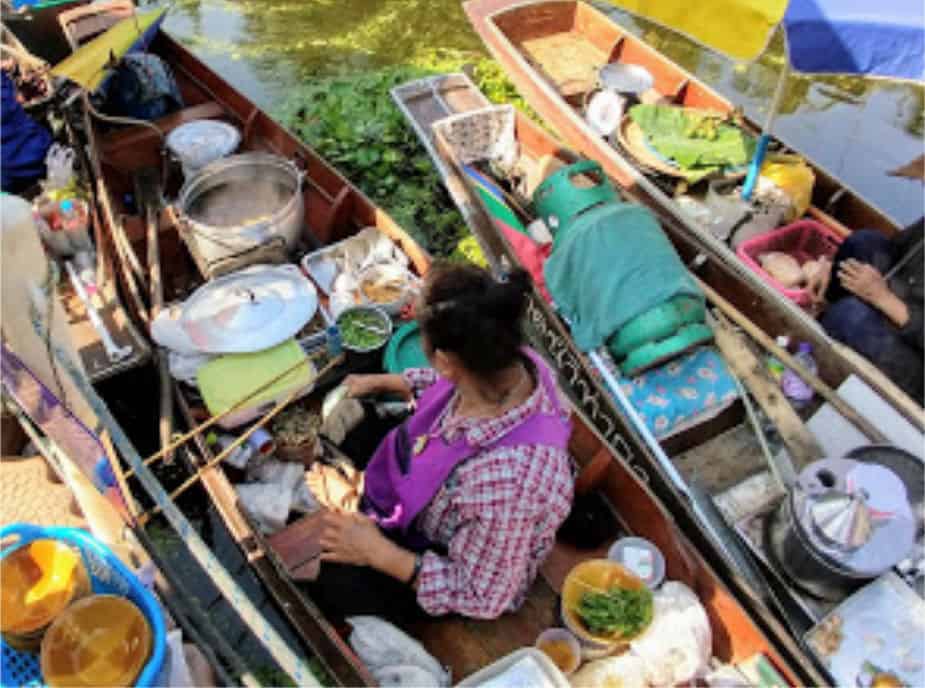
Limit Cash Usage
You will need cash in Thailand for most markets, tuk tuks, some taxis, songtaews and small food outlets. Try not to use it for big purchases.
You can use ride-sharing apps like Uber and Grab for cashless transportation in some parts of Thailand.
Book accommodation and pay for it online, we normally use Agoda for Asia as they are reliable specialists for the region, but Booking dot com or Expedia work just fine too.
It’s annoying to have to find a bank and withdraw cash when you’re travelling, so use your card where you can.
Should You Tip in Thailand?
There are no hard and fast rules about tipping in Thailand but it’s always nice to give something to a service provider doing a good job. Aim for around 10% and tip in Thai Baht, cash.
For Americans in Thailand
You’ve got it lucky! Certain US bank accounts refund cash withdrawal fees in foreign countries, including Thailand. I believe, but don’t know for sure, that you need to submit proof of fees.
We’re not American, so this isn’t something we can fully cover here. Investigate Charles Schwab.
British Credit, Debit and Bank Cards That Give You Zero Fees in Thailand
The UK’s Halifax bank had a card and account that can help you avoid foreign transaction fees.
Cumberland Building Society’s Plus account offered no fees on SOME ACCOUNTS ONLY.
NatWest and RBS Reward accounts offered a summer fee waver for a limited time.
Obviously, these banks and accounts change all the time, so double-check.
Starling, Monzo and Revolut Cards in Thailand
These 3 app banks, Starling, Monzo and Revolut offer free current accounts.
At the time of writing, Starling had no foreign fees whatsoever on foreign transactions and pays interest on your balance.
Monzo and Revolut allowed cash withdrawals and transactions of up to £200 a month without fees.
There is also Loot card, it gave your first 2 transactions free in 210 countries worldwide.
Source : Guardian Money 2018 Please double check for current information.
Payoneer Works Well in Thailand (It’s a blogger thing!)
My new best friend, my Payoneer Card, serves us very well in Thailand.
What is Payoneer? A Payoneer card was the ONLY way we bloggers used to be able to collect our international affiliate earnings.
Income from, for example, Amazon, goes straight onto the card so that you have, effectively, a pre-paid debit card.
It was possible to sign up to Payoneer here for a $25 cash bonus. The good news? I used to get a $25 bonus too. I wouldn’t suggest you use one if I didn’t have one myself and use it regularly.
However, Transferwise is also a good option these days. Payoneer is still a good choice for some circumstances and we do still have one and use it.
We’ve used our Payoneer card in 7-11 stores, in restaurants, shops and to pay for accommodation in Thailand. There were no fees and the exchange rate was good. Do not use it to withdraw cash, ever, you’ll pay for that service.
There is more information on Payoneer and affiliate income in this post.
The Old Rule, Don’t Carry Too Much Cash – Theft Prevention and Safety
It’s the oldest piece of travel advice out there, don’t get a big wodge of cash out of the bank and stick it in your pocket.
It could be stolen or, more likely, you could lose it.
We always feel very safe in Thailand, we don’t worry about theft, but if you’re heading to the big beach tourist spots and enjoying the nightlife, this could be more of an issue.
You could consider some of the money concealment devices below.
If there are 2 of you split the cash between you, some in wallet, some in bag, some elsewhere, is always a great idea. Just remember where you put it!
You may feel safer with one or more anti-theft travel devices during your time in Thailand. We have a full post on anti theft bags to keep your money, passport, phone, and more, safe in Thailand.
These bags normally offer RFID blocking, slash-proof internal mesh, wire enforced straps, lockable zippers and mechanisms to secure the bag to a fixture (for instance your chair or table in a restaurant). Take a look at those in the dedicated post on antitheft bags.
Save this to Pinterest.
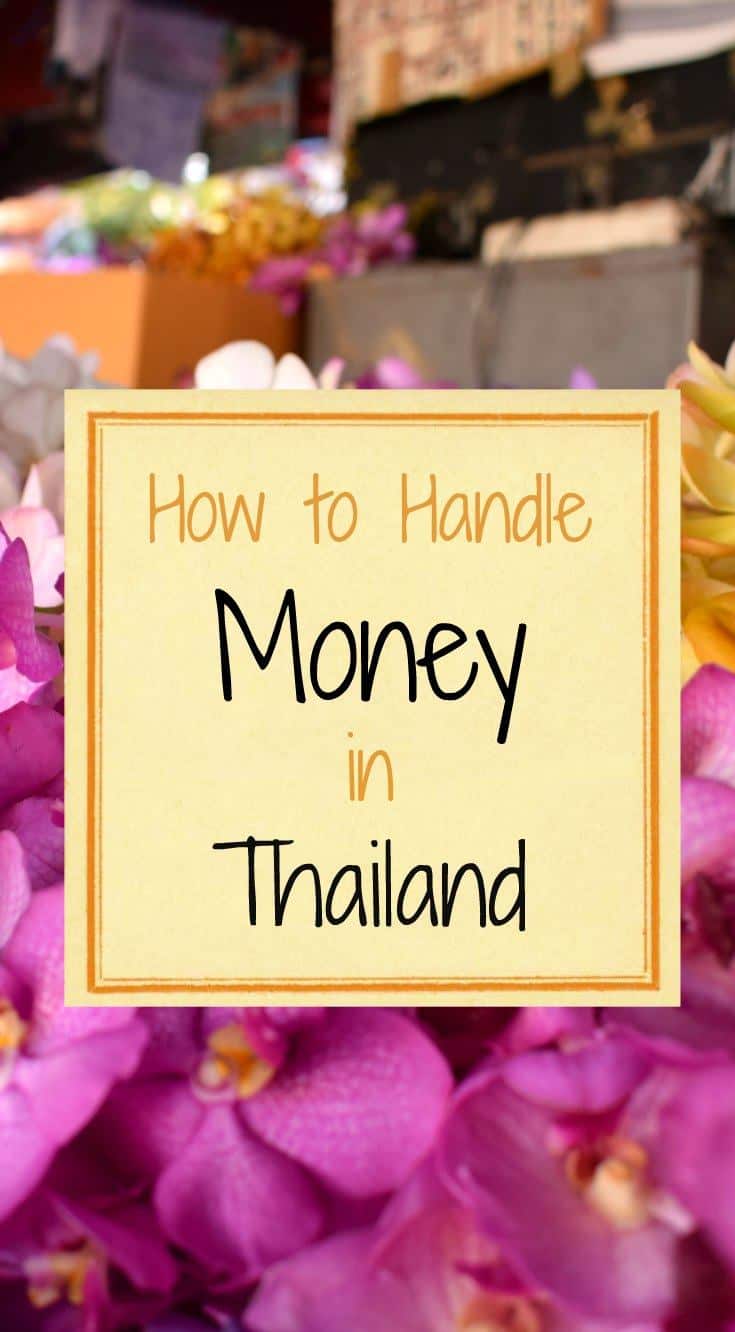
Thailand Currency
The official currency of Thailand is the Thai Baht (THB), with each Baht being sub divided into 100 satang. You’re unlikely to encounter coins or notes with values less than 1 Baht but 25 and 50 satang coins do exist. Currency is issued by The Bank of Thailand.
The symbol for Thai Baht is ฿. Numbers and prices are generally written in English (Arabic) numerals and are easy to read for tourists.
What Denominations Do Thai Baht Come In?
Thai Baht coins come in denominations of 1, 2, 5, and 10 Baht. Notes come in Thai Baht Values of 20, 50, 100, 500 and 1000 THB. 25 and 50 satang coins also exist.
Is It Better To Buy Thai Baht in Thailand?
Yes, you will normally get better exchange rates in Thailand than in your home country. Exchange cash at an exchange office to get the best rates. Withdrawing cash using your card may cost you a fee. Hotel exchange desks will likely give you a poor rate. You will find a currency exchange office easily in any part of Thailand tourists frequent.
What is One Thai Baht Worth?
1 Thai Baht is worth 0.03 USD, 0.043 AuD or 0.025 UK Pound Stirling. Obviously excchange rates fluctuate, this is just a rough guide.
Hotels and Hostels We Can Recommend in Thailand
A few places we use regularly. The hostels and guest houses are for flying visits, budget stays and transits, for more luxury stays (perfect with kids) try the Novotels mentioned.
In Bangkok we prefer to use Shanti Lodge (see here), a nice new one, Here Hostel, both are low budget solid choices for family backpackers and travellers, for a vacation, The Chatrium hotels are a solid choice.
Chiang Mai we like Central GuestHouse as it’s right on Tae Pae gate. A more luxurious option is Rainforest Hotel Chiang Mai.
For Phuket, and a more luxurious holiday, try Destination Resorts Karon Beach (formerly Novotel’s flagship on the island), we loved it. Or try the Novotel Resort Hotel Patong. Novotels usually have amazing kids/ facilities.
If you’d like more information on touring Northern Thailand (we did it by car) click through, it’s fantastic up there! Taking a road trip or driving holiday in some parts of Thailand is very possible and affordable. I wouldn’t drive around Bangkok, but we have taken rental cars in both Northern Thailand Pick up at Chiang Mai airport) and Phuket. Use this tool to find the best deals on car hire in Thailand (or anywhere.)
Back to our complete Thailand Travel Guide page or suggested itinerary page, we hope you have a great time on your vacation or holiday and can put our tips for handling your money in Thailand to good use in travelling cheaper and smarter. If you wanted to check out anti-theft bags and devices, they’re here. Our other absolute travel essentials are highlighted here.
If you'd like to hire a car during your stay, use this car rental comparison tool to find the best deal!
We also suggest you take a look at this company to get a quote for all kinds of the more tricky adventure or extended travel insurance.
Try Stayz / VRBO for an alternative way to find rentals on homes/apartments/condos in any country!

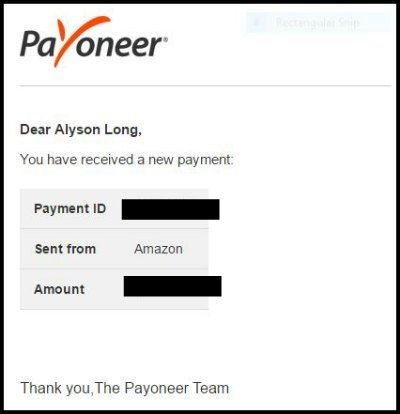





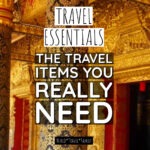


Hi there, what an excellent guide! thanks! would also like to add another tip – to use the ATM Fee Saver mobile app – this app gives ATM Fees and Withdrawal limits for ATMs for foreign cards holders in some 30-40 countries. ive used it in Thailand also and boy, so helpful! saved soo much money on unnecessary atm fees and expenses there. worth adding to your list, it will help so many travellers!
Hugely helpful info in there… Thank you so much. Can you advise on the use of Google Pay in Thailand? I’ve practically given up using cash for anything here in the UK as it is almost universally accepted, especially since the pandemic took hold
I honestly don’t know what Google Pay is. Is it when you wave your phone at the till? I do that here in Australia but the last time we were in Thailand I didn’t have it set up on my phone so I don’t know. You can bet that if it’s reached Far North Queensland they’ll have it in Thailand already.
@Alyson for World Travel Family, just used it at a 7-11 yesterday in Bangkok, with a French bank, worked perfectly.
Great to know, thanks! I now use Google Pay all the time, it was a bit slow to take off over here!
I have found the best way to spend money in Thailand is by using my Transferwise account. It is similar to Monzo, but where you pay the Mastercard exchange rates (tilted in their favour), Transferwise uses the rate that you see on Google (or the bank ‘base’ rate. You do pay a fraction of a percent, but it works out cheaper.
It’s also the best way to transfer money from one country to another.
When I was in Cambodia, I paid £100 to withdraw $100 using my conventional bank. If I had used this, I would have been at least $20 better off.
Hi, thanks for the info. I’m going to Bangkok for 5 nights. I know I should change money at Thailand as they give the best exchange rate. But then should I take out all the cash in my home country first which is the money I planned to use during my stay?
No, you can buy currency in Thailand using your card at a bank or currency exchange place. Or you can just withdraw cash at ATMs in Thailand – grab some at the airport when you land along with your local SIM card. Don’t stress, all will be fine.
Thanks very much for your helpful blog! We’re in Chiang Mai right now. I’ve checked a few different ATMs with different withdrawal amounts, each said ฿220 per transaction.
Thanks everyone for your input and ideas I’m off to Khoa lak on Monday think I’ll use the cash option it’s that old adage money talks I guess .
The worst thing about using ATM in other nations is that they charge you money for making transaction and some even charge you every single time you make transaction which can cost almost as your trip. It doesn’t have anything to do with policies of ATM distributor but it is entirely governmental policies on foreign finance exchange.
Hi! How many hours should I allot in BKK Airport if I am travelling on a peak season, is 3 hours enough?
It might be – unless your first flight is delayed. It’s always a risk with connecting flights when they’re not one ticket.
Hi there!
thank you so much for your advices.
We are from Germany and we’re already so excited for our trip to Thailand in August but still worriing about the money and how to handle it.
Actually we got us Revolut, since we actually thought they won’t charge us for unlimited cash withdraw (but you said only 200$, so we might think about this one again). We may would take most of our money as cash.
I will also check your anti theft tips, so we can feel safer.
If you have anything more to recommend, just go ahead!
Cheers!
Check that for yourself Latdi, The regulations may have changed on the Revolut card. I’ll look too.
Charles Schwab checking is amazing. You are reimbursed all atm fees at the end of the month. It’s a little annoying applying for it , because it’s all on the net. If you try to go to a branch they won’t help you. The only way you can deposit is through their app or sending it to them a check with these special envelopes they give you when you receive your welcome package. I’ve used it in Japan and Ireland recently and I had no problems. When you get your monthly statement you will see the reimbursement. No don’t need to save receipts and prove to them anything. I hope this helps ^ _ ^ happy travels~
It’s the same in Laos now. Cheapest we found was BCEL at 20,000 kip (2.50 USD) – everyone else charged 40,000 kip (USD 5). Made worse as you can only withdraw 1,500,000 kip at one time….
yep, it’s getting harder and harder to get money out without paying fees.
I have a Santander zero card for purchases in Thailand as it iswhat it says on the card , zero fees
In UK it’s Worth looking at “Starling Bank”, one of the new challenger banks. Works on an app and Debit card can be used to withdraw cash with no charges throughout the world at ATM’s displaying the MasterCard sign. (Except charges levied by ATM’s). Account can be topped up simply by using the app whilst on your travels.
It’s the ATM charges that are the problem though Derek, in Thailand they’re huge and now there really seems to be no way of avoiding them without getting either a Thai bank account or an account that refunds ATM charges, one of the Australian banks have recently started doing this and there are a few US banks and the British one Amy mentioned.
Can you use your Canadian visa or how would we go about getting money exchanged in Thailand without paying the big fees thank you
Canadian Visa should be fine, Visa is international. Master Card can sometimes be problematic.
what is the point of this?
The point is to dodge the huge atm fees in Thailand Marcin.
If I may add, this blog post refers to transferring money to Thailand using Bitcoin and Transferwise, including how to get cash sent to the Thai bank without a bank account.
I’m pretty sure using Bitcoin in Thailand is still a bit of a “gray” area legally. Not only that, but any Bitcoin exchanges tend to rip you off with purchase fees.
There are a number of new(er) online currency brokers that make international transfers to Thailand easy, but I’ve never heard of this Payoneer service before so I’ll have to give that a look. Where do they make their money if you just use the debit card and don’t take cash out??
If you use it for cash there is a fee, also there is an annual fee, about $30. Well worth having as it’s the only way people who earn online and travel can receive some payments ie. Amazon. We also use it for a number of other affiliate schemes.
We currently use Revolut prepaid card, usually we find an ATM without charges, have not tried it in Thailand though.
Obviously the exchange rate you get is just as important as any fees, Revolut give interbank rates!
Yes Revolut is a good choice for everywhere except Thailand! It doesn’t give the interbank rate on Thai Baht. I think this one is UK only. We have British accounts, so may give this card a try soon for European travel, although we have a Metro Bank card, that has zero fees in Europe, if the pound is up, it’s worth locking that rate in. Cheers!
I’m from the US and recently spent 4 months in Thailand. We opened a Charles Schwab account and were never charged any fee and were refunded any fee charged to us by the local atms. It made handling money so easy. We travel for a year to 14 countries and used the card everywhere. We were even refunded over $1000 when money was withdrawn from our account in Sri Lanka by someone using a skimming device a month after we left the country.
Yes, we know about that system in the States, unfortunately it is only available on American bank accounts. Nothing similar exists ( ie. the refund system) on any UK or Australian bank account that we can find. Hence the above dodge.
Alyson, I just phoned about a Charles Schwab account and you CAN open an account that reimburses for world wide ATM if you are a UK citizen. Sadly they won’t let me apply as I am Canadain….and here I thought we were good neighbors!! So maybe you’ll be in luck.
Us? we don’t need that, we’re happy with doing it our way. What are the requirements on the Charles Schwab in terms of fees, address, income etc? We have Metro because it’s free throughout Europe, suits us fine.
Great tips. We’ve saved a fair bit of of cash in Thailand through avoiding ATMs and withdrawing cash from banks instead, there have only been a couple of occasions where we’ve been denied and told to use an ATM instead. Luckily, there are loads of different banks to try in Thailand if one doesn’t work. We also have a UK current account with N&P, which is the only bank we found in the UK that doesn’t charge you a penny for using your card abroad. That has also saved us a lot of cash over the last four years of travel!
We use Metro Bnk Amy, which has zero fees throughout Europe. We’ll take a look at the N&P for sure.